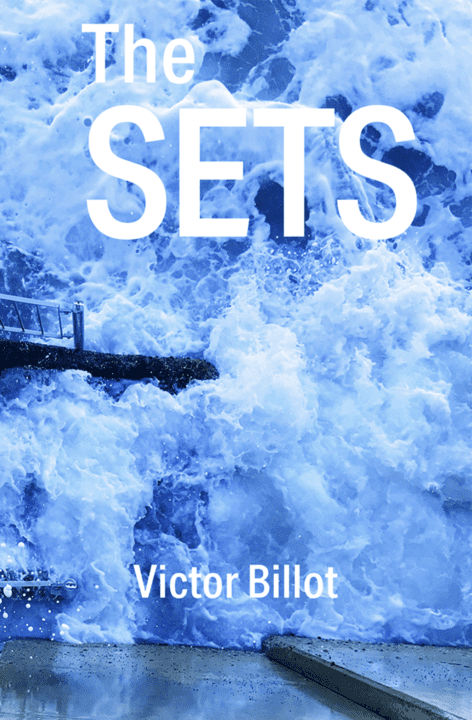Victor Billot, The Sets

The Sets by Victor Billot
Dunedin: Otago University Press (2021)
RRP: $27.50, Pb, 119pp
ISBN: 9781988592602
Reviewed by Vaughan Rapatahana
Victor Billot loves words. Lots of words. Not the common garden-type spinach and cauliflower words, but the variegated esoteric, arcane, and abstruse variety, often all at once. Take for example, these lines from ‘Capricorn and Bunker’:
Distant breakers crest the outer wall,
chuntering against sessile armour.
Cephalopods perambulate skeletal encasements,
slip through interstitial crevasses. (p. 98)
This quibble about the orotundity of Billot’s poetry aside, he does write damnably well. Often brutally, as when he dismantles with caustic cynicism the crushing capitalist machinations of the globalised world, especially throughout his second set, a pantheon of poems that demand to be performed. Some marvellous material here, for example, ‘The Prince of Darkness Attends a Work and Income Interview’ (p. 57). Hilarious and sustained black humour resounds throughout this piece.
Often candidly, as throughout his first set, which concentrates on whānau, busted relationships and the poet’s own past, he is never whakamā in setting out his emotional reactions to life’s upheavals. As here:
Their mother stares at you and any love there was once
is in that boat and burning too.
(from ‘Collection’, p. 22).
Often depressingly, as throughout set four, Billot dips deep and drenches us with images of drowning, death and destruction, encapsulated in the fine ‘48o 14.5’S, 168o18.76’E’ (pp. 108-9), which draws all these doom-nouns together as it relates the demise of a seaman far from home, beginning and ending the poem with ‘It’s not a sea. It’s ocean.’
Repetition is used with great effect here. Billot more than once repeats his opening line in the final line. He often repeats a line or two inside a poem (as in ‘Straight and Clear’, p. 27), and a few times he even repeats effective imagery such as ‘the glaucous sea’ (in ‘Gallimaufry’, p. 34), which we come to later in ‘In the glaucous dim of summer’ in ‘Snow Country’, pp. 110-111. A further example is ‘the dialect of waves’ (in ‘Selene’, p. 83) which is echoed by ‘the seas have forgotten the dialects of life’, also lifted from ‘Snow Country’.
What of set three? More excellent mahi here. An admixture of scenic South Island vistas s p r e a d e a g l e d for the reader to sense more vividly, and the poet’s experiences within these landscapes, both present and previous. At the same time he also sets out the immediate future for all of us, in poems such as ‘The Great South Desert” (p. 102), where the future will not be fun:
Dull heat baffles survivors hiding from the killer sun
In their valleys.
Not only is there lots of – sometimes fustian lingo, there is also a lot of poetry in this first collection – 64 poems in all. There are several poetic formats, ranging from the adumbrations of ‘The World Ends’ (pp. 74-5) to the terse verse of ‘Man Solo’ (pp. 61-3) and ‘The Hierarchy’ (pp. 45-6)), through to the found poetry of ‘Snow’ (pp. 37-9), and the envelope verse and rhyming couplets of the final piece, ‘Song of the Sea’, (p. 117). Billot effectively mixes up his verse like a magician shuffling his deck before the next trick. In so doing, he conjures up some wonderful lines, occasionally rhyming. Here is a selection:
The snaggled fang of a subcontinent’ (from ‘The Earth from Space’, p. 101).
And:
Ships glide through the throat of the harbour,
Models inserted into the glass bottle of summer.
(from ‘Port Chalmers’, p. 94).
And:
The tree is running September through its arms (from ‘Algebra’, p. 89).
An excellent compilation. Billot’s verbosity reminds me of another fine Dunedin poet, David Eggleton, who likes to collect words too.
Speaking of such leading Kiwi poetic voices, if Billot curbs just a little his tendency to overwrite in places, the route may well become much cleaner. When he writes excellent uncluttered and heartfelt poetry, as in ‘Phoning It In’ (pp. 43-4), ‘Esplanade, 1979’ (pp. 79-81), ‘Living in the Maniototo’ (pp. 82-3), ‘A Lift’ (p. 85) and the wrenching lament ‘Dark Water’ (p. 107) – among others – he hits the mark just right.
I look forward to the next wave of poems.
Vaughan Rapatahana
Vaughan Rapatahana commutes between Hong Kong SAR, Philippines and Aotearoa New Zealand. He is widely published across several genres in Māori and English and his work has been translated into Bahasa Malaysia, Italian, French, Mandarin. He participated in World Poetry Recital Night, Kuala Lumpur, September 2019, and Poetry International, the Southbank Centre, London in October 2019 – in the launch of Poems from the Edge of Extinction and in Incendiary Art: the power of disruptive poetry. Vaughan’s poem ‘tahi kupu anake’ is included in the presentation by Tove Skutnabb-Kangas to United Nations Forum on Minority Issues in Geneva in November 2019.

